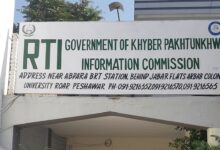RTI: SIC Orders SEPA to Disclose Ocean Ninety9 Project Details

The Sindh Information Commission (SIC) has directed the Sindh Environmental Protection Agency (SEPA) to make public the Experts Committee Meeting held for the deliberation of comments filed by the public regarding the Environmental Impact Assessment (EIA) report of the Ocean Ninety9 project.
This decision comes after well-known Right to Information (RTI) activist, Dr. Syed Raza Ali Gardezi, requested specific information from SEPA regarding the project.
Dr. Gardezi’s information request to SEPA included several key documents related to the Ocean Ninety9 project. He sought a certified copy of SEPA’s EIA approval for the project, the entry page for the project in the Schedule IX Register of EIA approvals, the minutes of the Experts Committee Meeting, the names of the committee members, and a certified copy of the committee’s decision.
When Dr. Gardezi did not receive the requested information from SEPA, he approached the Sindh Information Commission for assistance. During the hearing, SEPA’s Legal Advisor, Mr. Jamil Abbas Talpur Advocate, argued that the minutes of the Experts Committee Meeting and the certified copy of the committee’s decision were confidential and couldn’t be provided. However, he acknowledged that the remaining information could be shared with the appellant.
Dr. Gardezi contested SEPA’s stance, pointing out that other information commissions in Pakistan, including the Pakistan Information Commission, Punjab Information Commission, and Khyber Pakhtunkhwa Information Commission, have considered meeting minutes as public records once the matter is finalized.
In a three-page verdict signed by Chief Information Commissioner Dr. Jawaid Ali and Information Commissioners Shahid Abbas Jatoi and Saima Agha, the Sindh Information Commission ruled that all the information requested by Dr. Gardezi are public documents under Section 2(d & g) of the Act. The commission emphasized that SEPA must provide the requested information to the complainant within seven days.
Understanding Environmental Impact Assessment.
Environmental Impact Assessment (EIA) is a crucial process that evaluates the potential environmental effects of proposed projects or activities before they are undertaken. It aims to identify, predict, and mitigate any adverse impacts on the environment, natural resources, and human health. The importance of EIA lies in its ability to provide decision-makers, stakeholders, and the public with valuable information about the potential consequences of a project. By assessing the environmental implications, EIA helps to ensure that development activities are conducted in a sustainable and responsible manner. It allows for informed decision-making, promotes transparency, and encourages the consideration of alternative options that may be more environmentally friendly.






